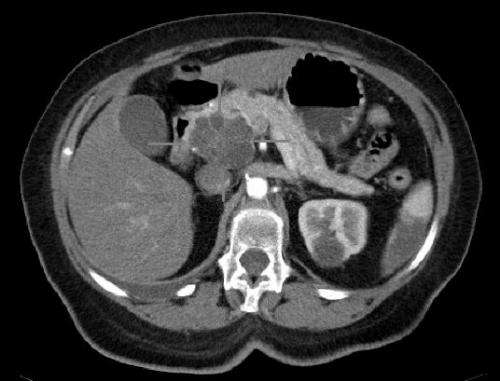Disrupting the cellular process that promotes pancreatic cancer's deadly growth

Researchers say they've identified a way to disrupt a process that promotes the growth of pancreatic cancers—one of the most difficult and deadly cancers to treat.
The team, led by scientists at Georgetown Lombardi Comprehensive Cancer Center and including investigators from Lawrence Livermore National Laboratories, STCube and Fluidigm, published their findings today in the journal Gastroenterology.
Pancreatic cancer is on course to be the second leading cause of cancer-related death in the country, according to the American Cancer Society, with most people surviving less than a year after diagnosis. Therapies approved to treat the cancer are poorly effective and extend survival by only a few months.
One of the hallmarks of the disease is a build-up of scar tissue called fibrosis, in which the cancer-associated fibroblasts (CAF) that trigger fibrosis serve a tricky dual role—depletion of CAF is just as likely to promote as inhibit pancreatic cancer.
"We hypothesized that if we can alter the microenvironment where cross-talk between the fibroblasts, immune cells and cancer cells happens, then we can cause just enough disruption to push back tumor growth," says lead author, Ivana Peran, Ph.D., a research instructor of oncology at Georgetown Lombardi.
To do that, the team focused on adhesion molecule cadherin 11 (CDH11), which is expressed by CAFs in the pancreatic tumor environment and has been associated with other fibrotic disorders where it is expressed by activated fibroblasts. They examined inhibiting CDH11 in tumors growing in mice.
Their hypothesis turned out correct. For the first time, the team demonstrated that CDH11 is important in the natural history of pancreatic cancer. "Knocking out" the ability of mice to produce CDH11 reduced the growth of pancreatic tumors, increased the tumor's response to a common chemotherapy called gemcitabine, reversed immunosuppression and significantly extended the survival of mice.
"Separately, we have identified a drug that can inhibit CDH11," said Stephen Byers, Ph.D., professor of oncology at Georgetown Lombardi. "This drug also inhibited the growth of pancreatic tumors and taken together with our earlier work, this finding warrants study in human clinical trials for people with pancreatic cancer whose tumors express CDH11."
More information: Ivana Peran et al, Cadherin 11 Promotes Immunosuppression and Extracellular Matrix Deposition to Support Growth of Pancreatic Tumors and Resistance to Gemcitabine in Mice, Gastroenterology, Published: December 08, 2020 DOI:doi.org/10.1053/j.gastro.2020.11.044
















